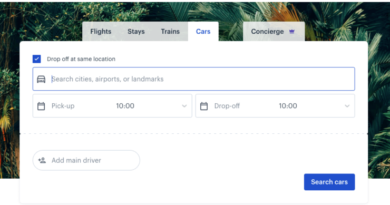5 ways hotels are changing to adapt to the future of work
Hotels have always played an intrinsic role in business. With corporate travel essential to the success of any company, traditionally, hotels hosted employees when they hit the road to secure new clients, attend a conference, or wine and dine important partners.
In the past, these spaces served a simple purpose. Business travelers were happy to find a comfortable pillow at the end of a long day. Hotels that boasted a fitness center or a decent bar and restaurant set themselves ahead of the pack.
But the arrival of the Covid-19 pandemic forever changed the future of work. Today 74% of U.S. businesses have adopted or are planning to switch to a hybrid working model, and their teams are spread out further than before.
This new approach has its benefits. Employees have a better work/life balance, with surveys revealing that 83% of American workers prefer a hybrid arrangement. Meanwhile, organizations are no longer as bound by location when seeking top talent as they were before.
But with employees working away from the office (at least some of the time), businesses are rethinking how they bring their teams together. Offsites are on the rise, both for company retreats and for shaking up surroundings for creative brainstorming sessions. Depending on colleagues’ locations, it might be more feasible for teams to come together away from HQ for training and onboarding processes.
With the list of reasons for business travel increasing, hotels will continue to be an important venue. But how is this aspect of the hospitality industry adapting to appeal to hybrid workers’ needs?

1. They are altering their in-room features
As the world slowly emerged from lockdown, hotels made sweeping changes to establish a safer stay. Properties rethought their room configurations to offer more in-room amenities, providing fitness equipment and musical instruments to improve their experience while avoiding excessive interactions with other guests.
While travelers’ desires to stay separated might have waned, hotels are sticking to the notion of well-appointed guestrooms. European chain Zoku is aiming to transform the concept of the hotel room with its pioneering Loft design. Boasting a chic decor that guests can personalize, the compact suite has been shaped with corporate travelers in mind. Each room features a fully-equipped kitchen, including a table for four, a cozy lounge area, and a separate desk nook kitted out with office supplies.
2. They are taking aim at the third space market
While the home office has its perks, it can be lonely. As humans, we crave interaction, and without it, we lose motivation. But in the hybrid working world, coming into HQ or another company hub might not always be feasible or preferential.
Employees might want the benefits of space away from the distractions of other coworkers. But might prefer a location where they can break out into communal areas rather than the lonely confines of their kitchen. Fulfilling this desire is where hotels have the potential to dominate what is becoming known as the third space market.
Originally embodied by coffee shop culture, the “third space” notion is defined as a location that operates in the gap between home and the office. As more hotel chains realize the value of offering an inviting, functional, and inspiring venue for hybrid workers, the nature of the visitors they aim to attract is changing. Rather than luring in long-haul corporate guests, the concept of the third space also taps into a local community tired of the isolation working from home can entail.

With this new market in mind, many hotels are incorporating chic coworking spaces into their offerings. Wyndham, for example, has launched the NEST business center in their Dubai property. Open to hotel guests and non-guests alike, visitors can reserve space on an hourly, daily, or monthly basis.
Where hotels can set themselves apart from the traditional coworking space is the range of extra amenities they already have to hand. In Bangkok, several properties have creatively pivoted, offering day passes to remote workers to compensate for the deficit in tourism in recent years. The Holiday Inn provides employees looking for alternative surroundings with complimentary tea and coffee and free use of the wellness facilities. Meanwhile, the Siam Kempinski offers a 12-hour day-use package, including a private suite, a complimentary mini-bar, and a three-course lunch at the hotel restaurant.
3. They are establishing themselves as an alternative HQ
While larger organizations might still have a physical office space, smaller hybrid businesses might have abandoned real estate altogether. With remote work distributing staff across the country or even the world, companies may increasingly turn to hotel meeting rooms as a new coworking area for their employees.
Unlike traditional coworking spaces, hotels can offer more flexibility in their pricing. Avoiding monthly or weekly membership models, companies can hire meeting spaces for the time they need while also benefitting from comfy rooms and central locations for their teams.
In the past, hotel business facilities often lacked inspiration and were typically limited to large-scale conference rooms. As corporate needs are evolving, so too are hotels by adding more flexible workspaces. Following the coworking concept, hoteliers are focusing on function, creating brainstorming spaces with expansive whiteboards for teams to come together and crack creative challenges together. Gone too are the days of meeting in the hotel lobby. Now private lounge areas are provided for conducting interviews or onboarding sessions in comfort.

4. They are offering subscription services for added perks
The next iteration in hotel hospitality might see brands offer monthly subscription services that give users various bonuses. Whether these initiatives will provide enough extra benefits to rival traditional points-based loyalty programs remains to be seen, but they are an interesting development in the hotel industry.
For example, CitizenM has launched its mycitizenM+ package, which guarantees users a room when booking over 48 hours in advance as well as free upgrades, late check-outs, and preferential rates. MycitizenM+ members can also jump the queue with their customer service agents and take advantage of exclusive events and experiences.
5. They are incentivizing longer stays
75% of millennial workers see opportunities to travel as a major perk of their job, with 65% seeing business trips as a status symbol. With the chance to explore new destinations a major motivator for most of the workforce, many businesses have become more flexible in allowing their employees to extend work trips for leisure purposes.
As a result, over 40% of business travel itineraries are now extended to include some vacation time. To take advantage of this latest travel trend, hotel chains are announcing specialized contracting to entice corporate travelers to extend their stay. One example of this comes from the globally renowned Hyatt, which has launched its ‘Work From Hyatt’ initiative.
On stays of five nights or more, guests can benefit from a host of perks, including;
- A guaranteed private workspace or a complimentary second guestroom to act as an office.
- Zero resort fees.
- Complimentary fast Wi-Fi.
- Free or discounted laundry services.
- A daily credit towards food and beverages.
- Free parking.
- Packages can be paid for and accrue further loyalty points for World of Hyatt members.

On the other hand, the boutique hotel brand Selina has adopted a different approach. With properties across four continents, Selina encourages repeat stays from entrepreneurs, freelancers, and remote workers with an innovative pricing model. Guests can pay as they go or opt for a global subscription.
Starting at $360 a month, the Nomad Passport provides travelers with 30 nights of accommodation in a quarterly window. While guests must commit to a minimum of three nights in each property, they are free to grab their laptops and hop between Selina’s wide range of destinations.
On top of appealing to digital nomads with flexible pricing, Selina is tapping into another rising trend. Rather than selling their services as a comfortable stay with the added benefit of a hotel coworking space, they are promoting their properties as an entire experience. As well as on-site networking events, travelers can book activities for the weekend or join in on volunteering opportunities at local NGOs.




